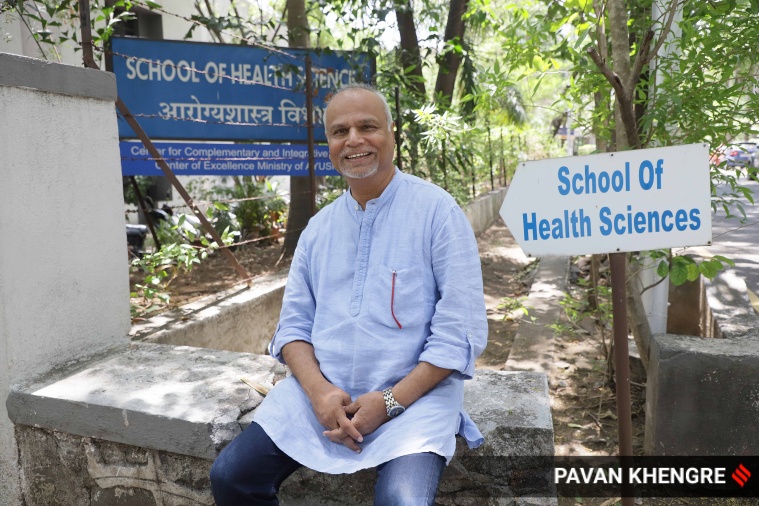[ad_1]
He plays an important role in India’s push to globalise its traditional medicine — as the country’s lead in a task force for the WHO Global Centre for Traditional Medicine in Gujarat. He had earlier steered key pillars of the country’s education system — University Grants Commission (UGC), Indian Council for Social Science Research (ICSSR) and National Assessment and Accreditation Council (NAAC).
And yet, Dr Bhushan Patwardhan reveals that he picked up some of his own life lessons from an unusual institution of sorts – Pune’s “Mandai Vidyapeeth” or simply, the market university.
“It was fascinating, really. I would often visit the market as I stayed nearby at the Patwardhan-Bhave wada (cluster of houses) opposite Tulshibaug. For instance, you would see what one can literally term as an ‘underhand’ deal. That’s how the buyer and seller would conduct confidential transactions, with a cloth placed over their hands. So, for a large pile of lemons, the vendor would take out a piece of cloth, place it on his hand and that of the customer, and negotiate the price with the movement of fingers. That’s it. The deal was clinched in an intelligent manner — price paid and lemons sold,” recalls Patwardhan.
 Patwardhan eventually decided against joining the transport business and devoted himself to academics and research. (Express photo by Pavan Khengre)
Patwardhan eventually decided against joining the transport business and devoted himself to academics and research. (Express photo by Pavan Khengre)
Then there were the open spaces at that “institution” — the Mahatma Phule Mandai, the city’s oldest market in Shukrawar Peth — where traders would meet, exchanging notes and insights. For Patwardhan, who grew up in a joint family of 24 members, Pune was all about that connection, with the market as the centre surrounded by Tulshibaug, Anand Ashram and lanes leading to Narayan Peth, Kasba Peth and Sadashiv Peth.
“We were just one big family where my aunt and mother ran a Montessori school for kids, called Bhave Shishu Shala, and my uncle had a milk dairy, Shriram Dugdhalay. The horn of the milk van, which would arrive at 10 pm, would alert us to get ready to fetch the cans,” Patwardhan says.
A student of Nutan Marathi Vidyalaya, which was a stone’s throw away from his wada, Patwardhan also recalls being often tempted by the “mouthwatering icecreams” at the famous Kaware Cold Drinks. “Of course, that was a luxury we could afford only once or twice a year,” he says.
Pathak sir’s chemistry lectures at Fergusson College
The first big step thereafter was Fergusson College. “I was exposed to another set of people,” says Patwardhan. Some classes were missed but one that he unfailingly attended was Prof S P Pathak’s chemistry lectures. “There were students from other colleges, including as far as Wadia College, and it was difficult to get a seat. Before the professor entered the classroom, the blackboard had to be wiped thoroughly as Pathak Sir filled it up with compound names, molecular formulas and phase diagrams. “It was a student’s delight and till date, no powerpoint presentation can live up to what came from this teacher in an unparalleled learning environment,” he says.
The next step was leaving Pune to pursue a postgraduate degree in biochemistry at Ahmednagar, more than three hours away, in 1979. He would return late on weekends to empty streets and ride home with his brother on a bicycle, eagerly biting into the local “misal” at the popular Khanna hotel “which then was the sole eatery that would remain open” at that time.
Later, Patwardhan would relish meals at Aniket Vidyarthi Kendra, the oldest canteen at Pune university. “My older brother Shriram Bhave started the canteen and I would sit at the cash counter looking at all the scientists and researchers coming by for chai,” he says. Interestingly enough, he also recalls a message displayed on a board on the stretch opposite the Arts department leading to the canteen: “Unaccompanied girls should not venture out on this road.”
Speaking about the university, Patwardhan says his grandfather D R Vaishampayan was the trusted driver of Barrister M R Jayakar, the first Vice Chancellor. Also, as a young boy of 12, Patwardhan would often accompany his father (“Raya Kaka”), who started a popular taxi service, on long drives to Nashik, Jalgaon and other places to hand over official papers from the university to other institutions. “I must have met so many principals at that time itself,” he recalls.
Patwardhan eventually decided against joining the transport business and devoted himself to academics and research. Later, as a PhD student, he set out to explore if ayurvedic medicines could destroy tetanus-causing bacteria. “With limited equipment available then at the university, I would cycle from one end of the city to the other. I would go to Serum Institute of India in Hadapsar and then to Hindustan Antibiotics Limited in Pimpri (a distance of nearly 25 km), all in one day. Those days, the roads were empty and it was enjoyable riding around,” he says.
These days, however, Patwardhan prefers to walk to the university where he guides research students as National Research Professor-AYUSH at the Interdisciplinary School of Health Sciences.
[ad_2]











